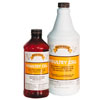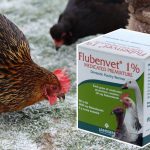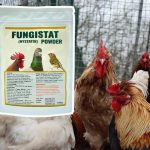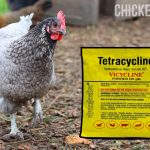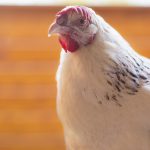Rooster Booster Poultry Cell: Usage & Full Ingredient Analysis
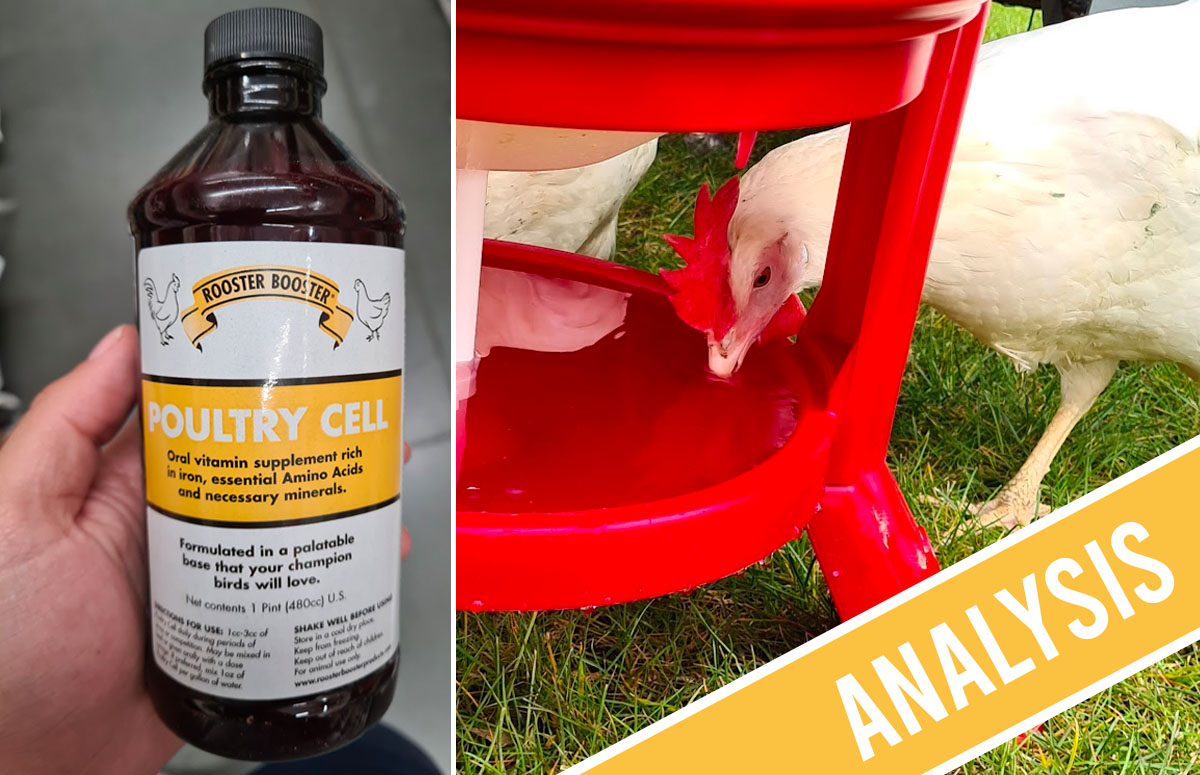
Chicken Fans is reader-supported. When you buy through our links, we may earn a commission. Learn more about our privacy policy and disclaimer.
Poultry Cell is a vitamin, mineral, and amino acid supplement for chickens and backyard poultry sold by Rooster Booster. The labels list a whole bunch of nutrients. But when and why should you use it? And what vitamins and minerals are missing?
We reviewed the entire list of ingredients to assess the pros and cons of Rooster Booster Poultry Cell.
If you are looking for the supplement, here is what we will be analyzing:
- Mix an ounce of Rooster Booster Poultry Cell per gallon of water daily during periods of any kind stress. Alternatively, add 1cc to 3cc of Poultry Cell in the feed or administer orally with a dose syringe.
Let’s dive into the nutrient list.
Vitamin, Mineral & Amino Acid Contents
Poultry Cell contains vitamins A, B, D, E, and K, minerals, and both essential and non-essential amino acids. All of them come in different amounts.
- Vitamins: vitamins are organic compounds essential for growth and development. Vitamins are vital for forming bones, feathers, and body tissue. They are also essential for the immune system of chickens and help protect against diseases. Lastly, vitamins are also key in the metabolism of fats, proteins, and carbohydrates.
- Minerals: minerals are inorganic substances that are also essential for the health and development of chickens. Important minerals for chickens are, for example, calcium, magnesium, and zinc. They are vital for bone and muscle development. They also play important roles in the functioning of enzymes in several biological processes.
- Amino Acids: amino acids are the small building blocks of proteins. These proteins are critical for the health and development of chickens. The chicken’s body can not synthesize all amino acids; some essential amino acids must be obtained from the diet.
Many nutrients in Poultry Cell exceed the daily recommended values.
Let’s dig a little deeper to see what’s in and what’s not.
Vitamin Content
Poultry Cell contains vitamins A, B, D, E, and K. The following table gives an overview of the vitamin content in Poultry Cell:
| Poultry Cell Ingredient | Amount | Category | % DV / kg |
|---|---|---|---|
| Vitamin A | 26,000 I.U. | Vitamin | 800% |
| Vitamin D-3 | 3,500 I.U. | Vitamin | 120% |
| Vitamin E | 50 I.U. | Vitamin | 250% |
| Vitamin B-12 | 60mcg | Vitamin | 300% |
| Menadione (Vitamin K-3) | 2.5mg | Vitamin | 100% |
| Riboflavin (Vitamin B-2) | 28mg | Vitamin | 560% |
| D-Pantothenic Acid (Vitamin B-5) | 50mg | Vitamin | |
| Thiamine (Vitamin B-1) | 60mg | Vitamin | 3000% |
| Niacinamide (Vitamin B-3) | 50mg | Vitamin | |
| Pyridoxine (Vitamin B-6) | 10mg | Vitamin | 200% |
| Folic Acid (Vitamin B-9) | 10mg | Vitamin | 100 |
In general, almost all vitamins that chickens need are present:
- Vitamin A: the supplement contains 350% of the daily value for a 5lbs Leghorn. Vitamin A is critical in maintaining vision in dimmed light, immunity, and overall growth and development.
- Vitamin B Complex: the supplement contains a vitamin B complex. Vitamin B supports healthy metabolism, energy production, and nervous system function. Poultry Cell contains 60mcg of vitamin B2 per ounce of fluid, which is 224% the amount of the daily value for a 5lbs Leghorn. It also contains 1200% DV of vitamin B1 and 400% of folic acid (vitamin B9) DV for that same egg layer.
- Vitamin E: the supplement contains 50 I.U. of vitamin E per ounce of fluid, which is 100% the amount of the daily value for a 5lbs Leghorn. Vitamin E is an antioxidant and helps protect cells from oxidative damage, supporting overall health and immunity.
- Vitamin K: the supplement contains 100% the amount of the daily value for a 5lbs Leghorn. Vitamin K is key in blood clotting, bone health, and overall growth and development of chickens.
It’s important to realize that Poultry Cell does not contain the following vitamins:
- Vitamin C: ascorbic acid is an essential water-soluble vitamin and antioxidant key to a chicken’s health. Chickens can partially synthesize vitamin C in their livers but still require dietary sources for optimal health. It’s also important for tissue development and the immune system.
- Vitamin B12: vitamin B12 is key for maintaining the nervous system and plays an important role in many body functions. Chickens can not synthesize all vitamin B12 by themselves.
When you try to boost a chicken’s health after a period of malnutrition or want to support the immune system, we recommend ensuring they have proper sources of vitamin C and vitamin B12.
In fact, Rooster Booster also provides a vitamin B12 supplement. If you want to understand the vitamin B12 requirements for chickens and when to supply vitamin B12, you can check out our article on vitamin B12 for chickens.
Mineral Content
Minerals are inorganic substances essential for chicken’s health and development.
Many minerals are readily available in a balanced diet. However, adding extra minerals to the diet can be beneficial when chickens are under stress, e.g., due to a disease outbreak, relocation, heat stress, or during growth.
The minerals included in an ounce of Rooster Booster Poultry Cell are given in the following table with the Daily Values per kg for Egg Layers and the maximum admissible levels regarding toxicity.
| Poultry Cell Mineral | Amount | Category | DV | Max |
|---|---|---|---|---|
| Magnesium (Mg) | .07% | Mineral | – | 125 ppm |
| Iron (Fe) | 400 mg | Mineral | 25mg | 500 ppm |
| Copper (Cu) | 44 mg | Mineral | 5mg | 300-500 ppm |
| Cobalt (Co) | 2 mg | Mineral | 0.15 – 0.25 mg | – |
| Manganese (Mn) | 39 mg | Mineral | 60 – 100 mg | 1000 ppm |
| Zinc (Zn) | 110 mg | Mineral | 60 – 85 mg | 2000 ppm |
| Selenium (Se) | 0.25 mg | Mineral | 0.2 – 0.25 mg | – |
Iron
The most important mineral in Poultry Cell is iron. A chicken needs about 25 mg/kg of iron. The supplement contains 400mg of iron per ounce of liquid. So that’s more than five times the needs of a 5-pound Leghorn.
Iron has many roles in the chicken’s body and is crucial for the body to carry oxygen in the blood. Chickens with iron deficiencies develop anemia, leading to weakness, poor growth, and reduced egg production. Iron is also essential for the immune system and energy production in the chicken’s body.
When you add Poultry Cell to the drinking water, ensure to refill the liquid once a day, as the iron will sink to the bottom.
Calcium
One important mineral that can not be found in Poultry Cell is calcium. Calcium is essential for chickens and is crucial for egg laying, bone health, muscle functioning, and many other body functions. Laying hens need 4-5mg of calcium daily.
If your birds are laying a lot of eggs, thin-shelled eggs, or molting, consider giving them extra calcium. To learn more about calcium supplements, which ones to choose from, and how much to add to your chicken’s diet, check our complete guide on calcium for chickens.
Amino Acid Content
Apart from vitamins and minerals, there is a long list of amino acids present in Poultry Cell.
Amino acids are the building blocks of proteins. These proteins are included in many fundamental biological processes in the body. They are essential for the growth, development, and repair of the chicken’s body.
| Poultry Cell Amino Acid | Percentage | Category |
|---|---|---|
| Lysine | .06% | Essential Amino Acid |
| Methionine | .07% | Essential Amino Acid |
| Alanine | .16% | Non-essential |
| Arginine | .25% | Non-essential |
| Aspartic Acid | .27% | Non-essential |
| Cysteine | .07% | Non-essential |
| Glutamic Acid | .56% | Non-essential |
| Glycine | .18% | Non-essential |
| Histidine | .07% | Essential Amino Acid |
| Isoleucine | .12% | Essential Amino Acid |
| Phenylolanine | .15% | Essential Amino Acid |
| Praline | .16% | Non-essential |
| Serine | .16% | Non-essential |
| Threonine | .11% | Essential Amino Acid |
| Tryptophan | .03% | Essential Amino Acid |
| Tyrosine | .16% | Non-essential |
| Valine | .18% | Essential Amino Acid |
The chicken’s body can not synthesize all amino acids. Some are essential amino acids that can only be obtained via diet or supplementation.
For us humans, we must get nine essential amino acids through our diet. These are histidine, isoleucine, leucine, lysine, methionine, phenylalanine, threonine, tryptophan, and valine. Our body can make all the other nonessential amino acids. For poultry, ten amino acids must be provided in the diet for maximum performance: the same nine as we need, plus arginine.
Cysteine and tyrosine are sometimes recognized as semi-essential amino acids. Arginine is only considered essential during rapid periods of growth.
Methionine, Lysine & Threonine
Out of the list above, lysine and methionine are the most important limiting amino acids. Threonine is the third limiting amino acid:
- Methionine: is involved in muscle building, feather, and protein synthesis. It plays a key role in DNA structures and gene expression.
- Lysine: is important for the growth, repair, and maintenance of body tissues and the absorption of calcium, which is essential for bone health and egg laying.
- Threonine: plays a significant role in gut health and protects it from harmful pathogens
As you might have noticed, those three aren’t abundant in Poultry Cell. However, plenty of those amino acids are present in a proper protein-balanced diet and protein treats like mealworms and black soldier flies.
It’s clear that Poultry Cell aids in adding extra elements to the amino acid profile, but that it’s not a replacement for protein feed and a proper diet.
If you want to learn more about amino acids, proteins, and the health benefits and requirements for chickens, check out our article on proteins for chickens.
Ingredients and Label Analysis
The label indicates the following ingredients:
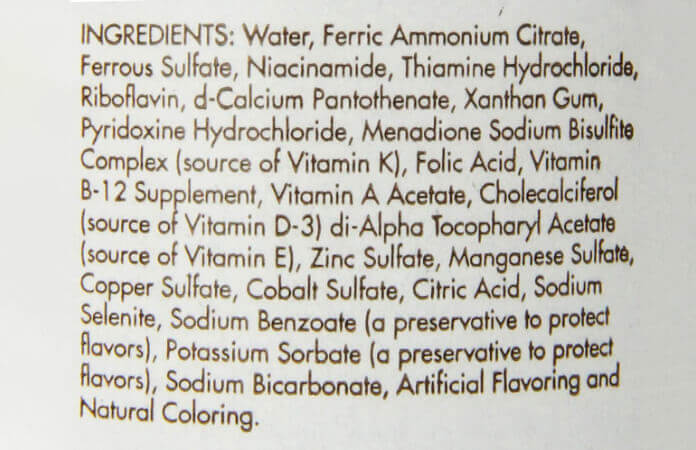
The following table lists all the ingredients and indicates why that specific ingredient is included in the supplement and whether it’s harmful to chickens when used excessively.
| Item | Reason for inclusion | Harmful for chickens? |
|---|---|---|
| Water | Carrier for nutrients and other ingredients | No |
| Ferric Ammonium Citrate | Source of iron | No |
| Ferrous Sulfate | Source of iron | No |
| Niacinamide | Vitamin B supplement | No |
| Thiamine Hydrochloride | Vitamin B supplement | No |
| Riboflavin | Vitamin B supplement | No |
| d-Calcium Pantothenate | Vitamin B supplement | No |
| Xanthan Gum | Thickener, stabilizer, and emulsifier | No |
| Pyridoxine Hydrochloride | Vitamin B supplement | No |
| Menadione Sodium Bisulfite Complex (Vitamin K) | Vitamin K supplement | Yes (in high doses) |
| Folic Acid | Vitamin B supplement | No |
| Vitamin B-12 Supplement | Vitamin B supplement | No |
| Vitamin A Acetate | Source of vitamin A | No |
| Cholecalciferol (Vitamin D-3) | Source of vitamin D | No |
| di-Alpha Tocopharyl Acetate (Vitamin E) | Source of vitamin E | Yes (in high doses) |
| Zinc Sulfate | Source of zinc | No |
| Manganese Sulfate | Source of manganese | No |
| Copper Sulfate | Source of copper | Yes (in high doses) |
| Cobalt Sulfate | Source of cobalt | No |
| Citric Acid | Preservative and flavor enhancer | No |
| Sodium Selenite | Source of selenium | Yes (in high doses) |
| Sodium Benzoate | Preservative to protect flavors | No |
| Potassium Sorbate | Preservative to protect flavors | No |
| Sodium Bicarbonate | Source of sodium and as a pH buffer | No |
| Artificial Flavoring | Flavor enhancer | No |
| Natural Coloring | Coloring agent | No |
Now that we’ve gone through the entire ingredient list, let’s have a look at how to use the supplement, in what situations you can use it, and when it’s better to switch to another product.
How to apply Rooster Booster Poultry Cell
Poultry Cell can be added to the drinking water of chickens, mixed in with the feed, or administered orally with a dose syringe. Always follow the instructions on the label.
The instructions on the bottle say to add 1cc to 3cc of Poultry Cell daily during periods of stress or competition. You can also mix an ounce of Poultry Cell per gallon of water.
- Mix an ounce of Rooster Booster Poultry Cell per gallon of water daily during periods of any kind stress. Alternatively, add 1cc to 3cc of Poultry Cell in the feed or administer orally with a dose syringe.
Since some minerals like iron tend to sink to the bottom of the bottle, shake the bottom well before using. Store the bottle in a dry place and keep it from freezing.
When to Use Rooster Booster Poultry Cell
You can use Rooster Booster Poultry Cell to boost your chicken’s health.
Adding vitamins, minerals, and amino acids to the diet of your chickens can help:
- During Illness: when a chicken’s immune system is fighting disease, it’s better to have optimal nutrient levels to boost the immune system. Chickens with diarrhea usually absorb fewer nutrients in their intestines and need extra supplementation.
- In stressful situations: when your chickens experience stress from transportation, handling, changes in the environment, small living conditions, and extreme heat or cold
- During molting: when chickens molt, they shed their feathers and grow new ones. This process is very demanding for the chicken’s body, and supplements can help with healthy feather growth.
- During peak lay: when chickens are laying eggs, their body requires extra nutrients to support the egg formation.
- For older chickens: the body of older chickens is less efficient in absorbing essential nutrients; adding vitamins, minerals, and amino acids to their diet can help ensure they are getting what they need to support their health.
- After periods of malnutrition: chickens that suffered from periods with poor food quality can use a health boost to get their metabolism back up and running
When to use Poultry Cell, Poultry Booster, or Vitamins and Electrolytes with Lacto Bacillus
Rooster Booster has many products with vitamins in its product line:
- Poultry Booster: a daily supplement to support overall health
- Poultry Cell: to support birds that are molting, are under stress, or suffer from illness
- Vitamins and Electrolytes with Lacto Bacillus: to boost the microflora and the immune system, ideal for chicks and chickens that have digestive problems
- Vitamin B12: a specific vitamin for chickens that only had plant-based food, suffer from feathering issues, nervous disorders, anemia, weakness, or perosis
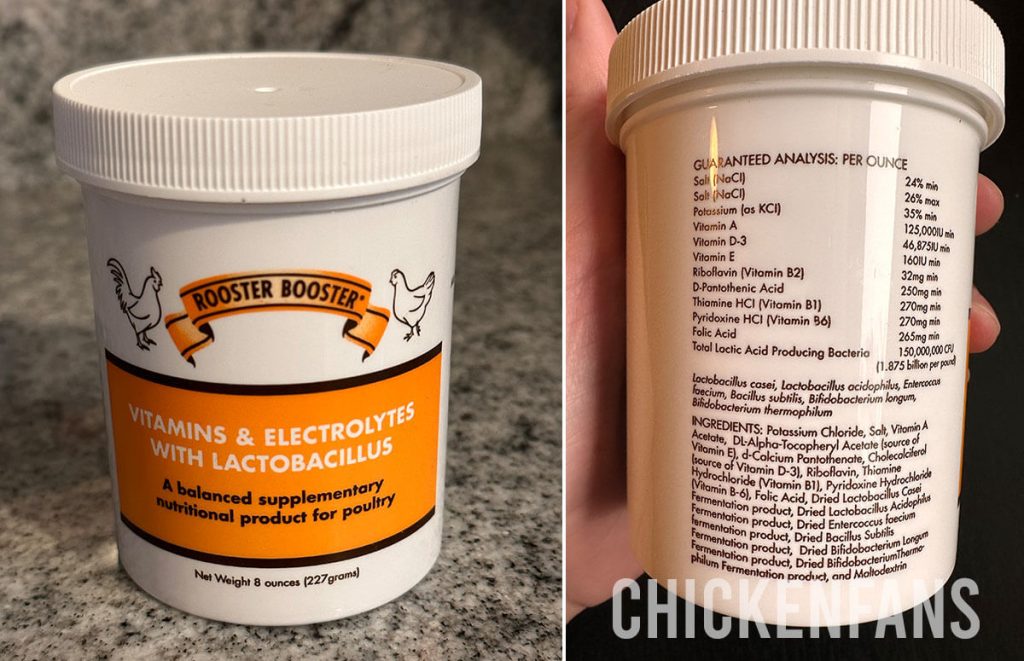
Remember that Poultry Cell does not contain vitamin C, B12, calcium, or Lacto Bacillus.
If you are interested in any of these nutrients, check out the following related articles on their use and when and how to use them correctly.
Further Reads
- Rooster Booster Vitamins & Electrolytes with Lactobacillus: a vitamin and electrolyte supplement that also contains probiotics
- Vitamin B12 for Chickens: an essential vitamin that chickens can’t get from plant-based food
- Probiotics for Chickens: probiotics are natural supplements with live microorganisms found in the chicken’s digestive system. They promote a healthy gut, boost the immune system, egg laying, and prevent viral and bacterial diseases.
- Calcium for Chickens: Calcium is essential for chickens as it’s vital for egg production, controls heart rate and blood clotting, promotes a healthy nervous system, supports growth and development, boosts bone strength, activates digestive enzymes, and regulates the body’s pH.
- Vitamin K for Chickens: vitamin K is a group of 3 chemicals essential for blood clotting, biosynthesis of proteins, bone composition, and embryo development in chickens and poultry.
- Vitamin D for Chickens: Vitamin D is essential for chickens, especially laying hens and chicks. It supports skeleton development and proper immune functioning.
Frequently Asked Questions
Rooster Booster Poultry Cell can be added to the drinking water of chickens, mixed in with the feed, or administered orally with a dose syringe. Mix an ounce of Poultry Cell per gallon of water or add 1-3cc of Poultry Cell daily during periods of stress.
Rooster Booster Poultry Cell is a vitamin, mineral, and amino acid supplement that can be used to temporarily boost a chicken’s health during illness, molting, stress, heat, peak lay, or recovery after malnutrition.
Mix an ounce of Rooster Booster Poultry Cell per gallon of drinking water.
Mix at maximum an ounce of Rooster Booster Poultry Cell per gallon of drinking water for chicks or add 1cc of Poultry Cell daily. Chicks have roughly the same vitamin and mineral requirements as growers and layers, and they will drink much less, which compensates for the amount they ingest.
Yes, Rooster Booster products are supplements that can be used for hens, and many products like Poultry Cell are especially useful for hens in their laying period or during molting and stress.
Supplements like Rooster Booster Poultry Cell are supplements that are safe when following the instructions on the label. Excessive use can cause problems due to high doses of certain vitamins like vitamins K and E or minerals like Copper Sulfate. In cases of severe illness, always consult a vet.
Yes, the eggs are safe to eat, and there is no egg withdrawal time for chickens that get Poultry Cell.
